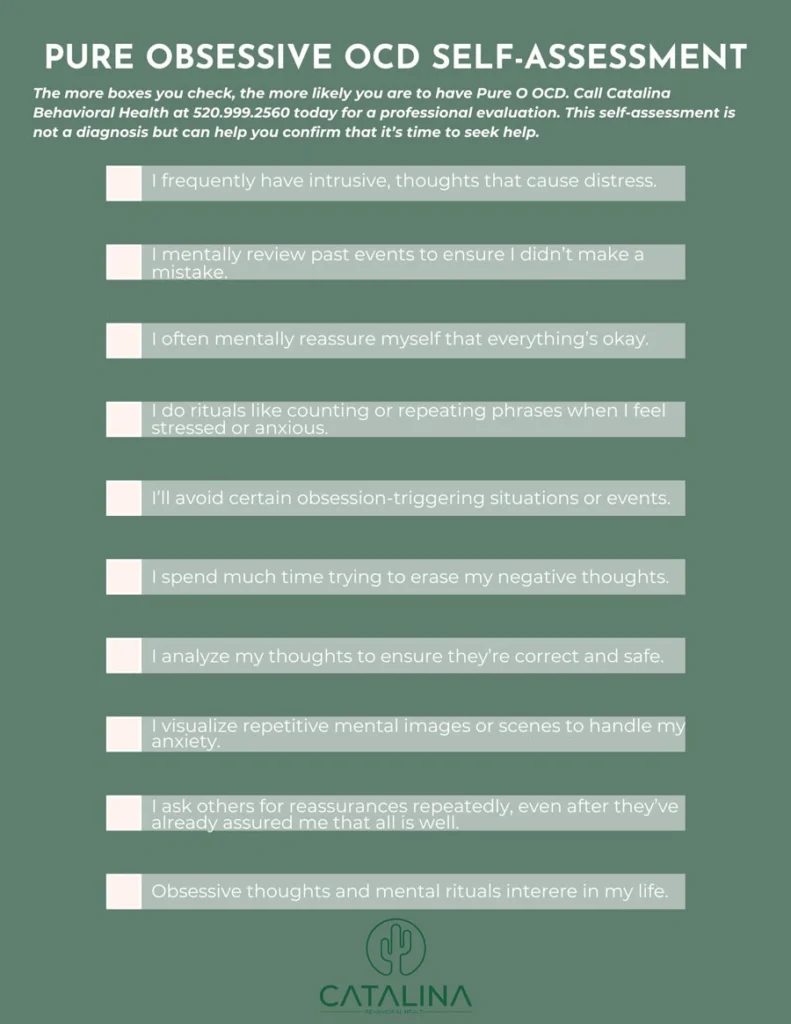Understanding Pure Obsessional OCD and Treatment Options
Pure Obsessional OCD, sometimes called Primarily Obsessional OCD, is one of several Obsessive-Compulsive Disorder (OCD) subtypes. Our Pure O OCD test can help you determine if your obsessions and compulsions mean you may have this mental health condition. You should always follow self-tests by seeing a qualified mental health professional.
Pure O OCD differs from traditional OCD, where the compulsive behaviors are usually visible compulsions. Think of hand washing, door locking, or hair plucking. Instead, Pure O OCD involves internalized mental compulsions. These can include mental rituals like repeating a phrase or visualizing specific mental images. Despite the internal nature of the compulsive behaviors that stem from the intrusive thoughts; Pure O OCD can be just as disruptive as standard OCD symptoms.
The Catalina Behavioral Health team in Tucson has helped many with OCD, pure and other types, to find balance in daily life. Keep reading to learn how we can help you or your loved one learn more about OCD obsessions and find the right treatment.
Take Our Informal Pure O OCD Quiz

Intrusive thoughts and compulsions to self-soothe internally degrade your well-being over time. It’s a better idea to face your challenges head-on instead of avoiding seeking help. This specific test is not a diagnosis or therapeutic tool.
After you take the quiz, reach out to Catalina and schedule a consultation; our team can help you decide if the obsessions and compulsions are OCD or if the symptoms point to a different concern.
Please continue reading. We want to help you to learn more about Pure O OCD, how it is similar and differs from other types of OCD, and how the intrusive thoughts and other symptoms can impact your quality of life.
Get Confidential Mental Health Assessment
Pure Obsessional Obsessive Compulsive Disorder – Mental Rituals
The Diagnostic and Statistical Manual (DSM-5) and the American Psychiatric Association recognize obsessive-compulsive disorder as a diagnosed condition that requires the help of a mental health pro to resolve.
There are many types of OCD, some harder to understand than others – pure O obsessions counting among them. All OCD starts with obsessive thoughts, which the person usually acts on through visible physical compulsions. Because the pure obsessional type of OCD remains inside the brain, the person must alleviate distress associated with it by acting out mental compulsions.
Here are some examples of some common compulsive behaviors of Pure O OCD:
Reassurance Seeking Behaviors
Many are seeking reassurance after the obsessive thought. With pure obsessional OCD, this means seeking reassurance by continuously checking one’s safety. Compulsive reassurance-seeking can offer temporary relief but leads to ongoing, significant distress for most people.
Example:
‘Mary’ constantly has distressing thoughts about her partner ‘Jim’s’ fidelity. She overanalyzes conversations between them in her mind, searching for clues he’s cheated and reassuring herself that he’s not. She mulls over past events they’ve attended socially and questions Jim’s casual interactions with other women. When she finds no evidence of Jim cheating or being a bad person, she feels good again.
The behaviors give Mary short-lived self-reassurance that he’s faithful. Long-term, she is causing harm to her relationship and enduring real-life anxiety.
Mental Compulsions Can Be Superstitious Behaviors

Some people have unwanted thoughts related to a traumatic event. Superstition becomes an inappropriate coping mechanism they develop in response to the anxiety they feel. They start relying on superstitious behaviors and beliefs to regain a sense of order and control. It offers a false sense of security that can delay seeking OCD treatment.
Example:
‘Jameel’ was in a car wreck that left him emotionally scarred but physically unhurt. He developed a superstitious belief that because the wreck occurred on the 12th day of the month, precisely at noon, the number afforded special protection.
When intrusive thoughts of the accident popped into Jameel’s mind, he’d calm the anxiety by silently counting to 12 or visualize the numerals dancing through his mind. The belief that “12” protected him gave Jameel a false sense of security. He didn’t recognize his behaviors as part of broader trauma-related disorders or get treatment.
Mental Reviewing of Past Actions or Events
Intrusive thoughts can lead to anxiety that leads to compulsions, where the person will constantly replay past events, discussions, or actions in their mind. These OCD (Pure O) symptoms can become disruptive and take up time or become debilitating.
The obsessions and resulting compulsions mean the person lacks focus. They might even have a hard time working or going to school in the worst cases of mental review.
Example:
‘Lex’ finds their mind consumed by mentally reviewing every interaction from the day. They play events as if on an unending loop and analyze every word and action. Lex feels anxiety about what others think about them. Because of their sexual orientation, many people have rejected or hurt them in the past.
The constant mental reviews leave Lex confident that all is okay. But the daily mental rituals have trapped them in a cycle of ever-perpetuating anxiety that they don’t understand.
Get Confidential Trauma and PTSD Assessment
Diagnosing Pure O OCD
Psychiatrists or psychologists diagnose Pure O OCD using the DSM-5 as the main diagnostic tool. They will have a long discussion with the person, look into their psychological history, and try to understand how the obsessions and compulsions interfere with daily life.
They will next assess the symptoms. They’re looking for the presence of unwanted thoughts (obsessions) and mental rituals (compulsions that relieve anxiety). They should also rule out any other mental health conditions causing the symptoms, such as depression, anxiety or panic disorders, or traditional OCD.
Evidence-Based Therapies for Treating OCD-related Mental Disorders

Pure O OCD obsessions and compulsions can often co-occur with other mental disorders, including substance abuse, PTSD, anxiety, or depression. Getting relief takes help from a mental health professional who can help undo the disruption and harm OCD causes.
Therapies are personalized to help each person and largely depend on specific OCD types. or Pure O OCD, these are some likely treatments:
- Cognitive behavioral therapy (CBT)
- Exposure and response prevention (ERP)
- Acceptance and commitment therapy (ACT)
- Mindfulness-based cognitive therapy (MBCT)
- Dialectical behavior therapy (DBT)
Therapies will occur individually, with peer groups, or with family members who will support you during your journey to better mental wellness.
Besides these behavioral interventions, your mental health professional may use medication management strategies. That could mean prescribing SSRIs or antidepressants to help lower the number of unwanted thoughts.
Up To 100% of Rehab Costs Covered By Insurance
Catalina Can Help You Manage Obsessions and Compulsions
If you believe you have Pure O OCD or a similar mental disorder, it’s time to seek professional help. Catalina Behavioral Health will ensure you receive an accurate diagnosis and provide you with the proper therapies to reduce the intrusive thoughts and compulsions you’re struggling with.
We work with all top insurance plans and can verify insurance coverage details via a confidential call and consultation. Catalina seeks to make getting treatment for Pure O OCD and any related conditions affordable and equitable.
We look forward to learning more about your needs, so please reach out for support today.





